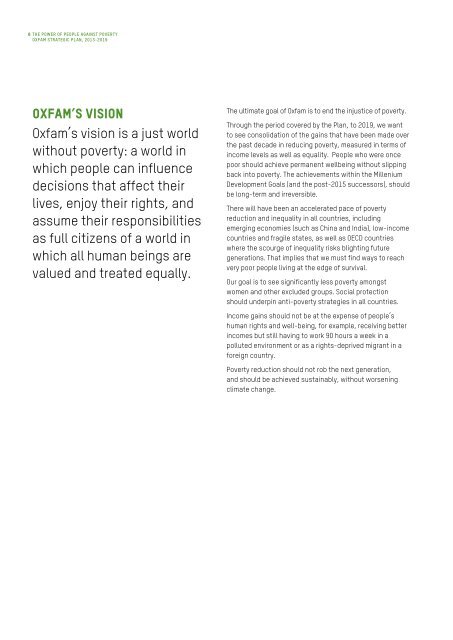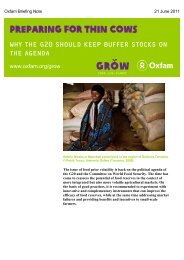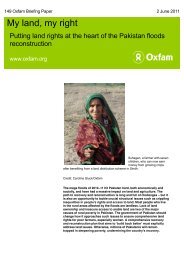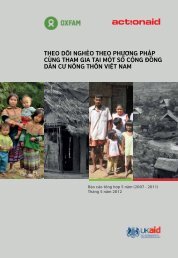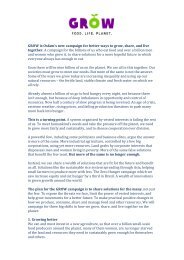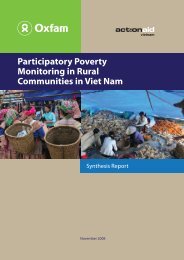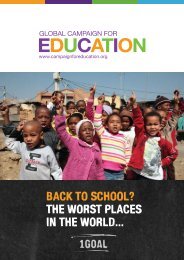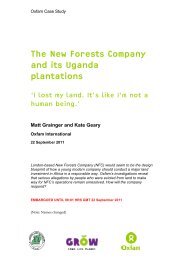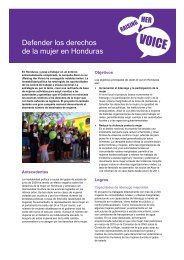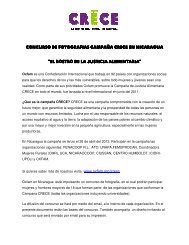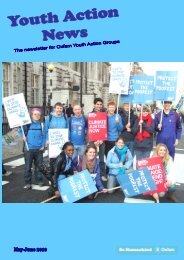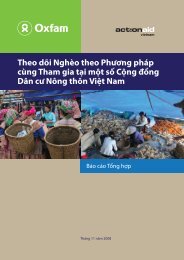Oxfam Strategic Plan, 2013-2019
Oxfam Strategic Plan, 2013-2019
Oxfam Strategic Plan, 2013-2019
Create successful ePaper yourself
Turn your PDF publications into a flip-book with our unique Google optimized e-Paper software.
6 THE POWER OF PEOPLE AGAINST POVERTYTHE POWER OF PEOPLE AGAINST POVERTY 7OXFAM STRATEGIC PLAN, <strong>2013</strong>-<strong>2019</strong>OXFAM STRATEGIC PLAN, <strong>2013</strong> – <strong>2019</strong><strong>Oxfam</strong>’s Vision<strong>Oxfam</strong>’s vision is a just worldwithout poverty: a world inwhich people can influencedecisions that affect theirlives, enjoy their rights, andassume their responsibilitiesas full citizens of a world inwhich all human beings arevalued and treated equally.The ultimate goal of <strong>Oxfam</strong> is to end the injustice of poverty.Through the period covered by the <strong>Plan</strong>, to <strong>2019</strong>, we wantto see consolidation of the gains that have been made overthe past decade in reducing poverty, measured in terms ofincome levels as well as equality. People who were oncepoor should achieve permanent wellbeing without slippingback into poverty. The achievements within the MilleniumDevelopment Goals (and the post-2015 successors), shouldbe long-term and irreversible.There will have been an accelerated pace of povertyreduction and inequality in all countries, includingemerging economies (such as China and India), low-incomecountries and fragile states, as well as OECD countrieswhere the scourge of inequality risks blighting futuregenerations. That implies that we must find ways to reachvery poor people living at the edge of survival.Our goal is to see significantly less poverty amongstwomen and other excluded groups. Social protectionshould underpin anti-poverty strategies in all countries.Income gains should not be at the expense of people’shuman rights and well-being, for example, receiving betterincomes but still having to work 90 hours a week in apolluted environment or as a rights-deprived migrant in aforeign country.Poverty reduction should not rob the next generation,and should be achieved sustainably, without worseningclimate change.The Power of People againstPovertyToday 1 billion of the earth’s 7 billion women and men live inavoidable extreme poverty. Within a single generation, theearth will be inhabited by 9 billion people, and 90 per centof the additional 2 billion inhabitants are likely to be borninto poverty.The challenge of our generation is to find the ways tochange those odds. How can we reduce extreme poverty,increase people’s rights, and balance the ecologicalsystems that sustain life and the economic systems thatsustain wealth? The answer is, simply, justice; fair useof the world’s natural resources; a global economy thatreduces inequality; a world that does not discriminateagainst women or minorities.<strong>Oxfam</strong>’s contribution is to use an integrated approach,reducing poverty by addressing the causes of poverty,locally, nationally and globally. <strong>Oxfam</strong> works at the mostfundamental level to save lives in humanitarian crises,and at the grass-roots level to promote development;and, simultaneously, we link local action with crucialcampaigning that draws on our advocacy in support ofpolicies and practice that underpin justice and well-being.We couldn’t do either well without the other, and it isweaving together this complex web of efforts and joiningwith others, in dialogue or in protest, that <strong>Oxfam</strong> has foundto be effective.Increasingly the focus has shifted with the understandingthat exclusion, inequality and injustice are the real target,more than simply a lack of income. The most effectivesolutions lie in people demanding their rights to livelihoodsand decent work, and working together to increaseliving standards and reduce vulnerability. <strong>Oxfam</strong> works toenable people to become fully integrated and respectedmembers of their society and economy. We do this byworking with communities, lobbying for change by nationalgovernments, or campaigning globally to change the waythe policies of rich countries create or perpetuate theinjustice of poverty.There are some recurring priorities that underpin all ourlocal-to-global work.In all <strong>Oxfam</strong>’s programming, campaigning and humanitarianrelief efforts, we support people to claim and exercisetheir basic rights, to life and security, a sustainablelivelihood, and the most essential services to sustain lifesuch as health and education. The right to be heard andto have a recognized identity are also a fundamental partof human well-being. These rights are explicitly groundedin the Universal Declaration of Human Rights of the UnitedNations, and the relevant Treaties and Covenants.In the coming years, we will continue to place a highpriority on supporting women at all levels to becomeleaders and take valued roles in the society and economy.Women are proving their power to lead communities andbusinesses and thwart the violence and oppression thathas kept them illiterate and exploited in many parts of theworld.Equally, campaigning to arrest runaway climate changeis part of our effort to prevent natural disasters andadapt to environmental conditions. We want to ensurethat poor countries do not pay the price for the historicalresponsibility of the polluting rich world which has enjoyedunrestricted carbon-based development. This underpinsour work on sustainable development and food; ouradvocacy for more equality between parts of the worldand within countries; a belief that fairer sharing of scarcenatural resources is vital for the future of the planet andhumanity.These approaches form the basis for the <strong>Strategic</strong> <strong>Plan</strong>.Fortunately, there are grounds for optimism.Within the last two decades, 660 million people haverisen out of poverty. Average real incomes in developingcountries have doubled and the world’s average lifeexpectancy has increased by four years. We are developingthe understanding of what is needed to reduce poverty invaried and complex circumstances.Investment in small-scale farming, particularly womenfarmers, can make big inroads on poverty. There is much tolearn from the experiences of large-scale poverty reductionin East Asia. Brazil has demonstrated that effective taxsystems to finance good quality public services, such ashealth and education, can reduce poverty and inequality.There are also increasing numbers of governments thatprove the importance of effective states, without which itis impossible to tackle poverty. Some developing countrygovernments are establishing social safety nets to protecttheir most vulnerable and excluded citizens – a vitalmeasure to address inequality and fairness.


